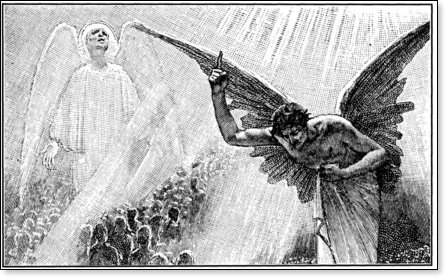
Rev. Mark H. Creech

A few years ago, I came across a tremendous sermon written by Theodore F. Adams, the late pastor of the First Baptist Church, in Richmond, Virginia. Adam’s message was titled “The World That is not Yet – But Ought to Be.” Adams said he based the message’s theme on a prayer once prayed by his brother, who was also a minister, in which such phrasing was used. Adams wrote:
“Do we really believe what Jesus said: ‘All power is given unto me’? Who is to dominate this world – what faith and what philosophy? Is the world to be turned over to those whose idea is ‘rule or ruin;’ or do we really believe Jesus when he says, ‘All power is given unto me…Go ye therefore, and teach all nations, baptizing them…teaching them to observe all things whatsoever I have commanded you: and, lo, I am with you always, even unto the end of the world.’
“Have we surrendered the dream; or do we still cherish the vision of our Lord when he taught us to pray, ‘Thy kingdom come. Thy will be done in earth…?’ Surely that is the hope we cherish – the hope for ‘a world that is not yet, but ought to be.’
“That is the dream we cherish – a world that is not yet but that certainly ought to be, the world to which Christ came and for which he lived, and suffered, and died, and lived again! If the kingdoms of this world are really to become the kingdom of our Lord and of his Christ, ours is a task to challenge the best that is in us. We need in such a day as this a faith with a world vision and God’s vision for the world of our day. Ours is the task to win that world to Christ as Lord and to see that Christ really is Lord in all of life, as well as in all the world.”
Certainly, every faithful student of the Bible believes this way. This is the calling of God for every follower of Christ. This is the work to which Christ commissioned his disciples, and it is the work that believers of every age must do until this world that was not what it ought to be, finally is. Christians should be unified in this endeavor. However, there is some disagreement among God’s people about the way this vision ultimately comes to pass.
The subject of The Millennium is taken up six times in chapter 20 of the Book of Revelation. The word “millennium” means a thousand years. Dr. Henry Morris in “The Revelation Record” says:
“The twentieth chapter of Revelation has been the major battleground of the various competing systems of biblical eschatology. In general, the way in which this chapter is interpreted seems to determine how the entire Book of Revelation and, to a large extent, how biblical prophecy as a whole is interpreted. It is in this chapter that the record appears of a thousand-year period [The Millennium] when Satan is bound and the world is ruled in righteousness by Christ and the people of God.
“But the question is whether, and to what extent, this record should be taken literally. Is this thousand-year period exactly 1,000 years, or is the number merely a symbolic number? Is Satan literally imprisoned and powerless during this time, or is he bound only in a relative sense by the liberating power of the gospel? Is Christ to reign in a direct sense over the earth, on a literal throne, or is this only a figure of speech referring to the eventual conversion of the world to righteousness through the work of the Church and the preaching of the gospel?’”

Consider what the first three verses of the 20th chapter of Revelation say:
“Then I saw an angel coming down from heaven with the key to the bottomless pit and a heavy chain in his hand. 2 He seized the dragon—that old serpent, who is the devil, Satan—and bound him in chains for a thousand years. 3 The angel threw him into the bottomless pit, which he then shut and locked so Satan could not deceive the nations anymore until the thousand years were finished. Afterward, he must be released for a little while (Revelation 20:1-3).”
In “The Millennial Kingdom” by John Walvoord, Walvoord summarizes the three primary views on the coming thousand-year reign of Christ on the Earth.
The first view is “premillennialism,” which takes a more literal view than any other. “It views the end of the present age as sudden and catastrophic, with great judgment upon the wicked and the rescue of the righteous…Premillennialism generally holds to a revival of the Jewish nation and the repossession of their ancient land when Christ returns. Satan will be bound (Rev. 20:2) and a theocratic kingdom of righteousness, peace, and tranquility will ensue.”
The second view is “amillennialism,” which Walvoord notes is the most popular view of the coming millennium. “Its most general character is that of denial of a literal reign of Christ upon the earth,” says Walvoord. “Satan is conceived as bound at the first coming of Christ. The present age between the first and second comings is the fulfillment of the millennium…It may be summed up in the idea that there will be no millennium than there is now, and that the eternal state immediately follows the second coming of Christ.”
The third view is “postmillennialism.” Walvoord explains that postmillennialists “hold that the present age will end with a period of great spiritual blessing corresponding to the millennial promises accomplished through the preaching of the gospel. The whole world will be Christianized and brought to submission to the gospel before the return of Christ. The name is derived from the fact that in this theory Christ returns after the millennium.”
Some mighty theologians have held to the amillennial and postmillennial positions. There is no heresy in either of these two views. But in my estimation, they are almost completely dependent on an allegorical or symbolic interpretation of Scripture, which leaves entirely too much room for the interpreter to impose his own views on the text rather than simply taking it for what it says. It also excludes the ability of the average person who reads scripture to determine what the supposed symbolic language represents.
Moreover, despite the erroneous argument by amillennialists and postmillennialists that premillennialism is largely a new or very young approach to eschatology, the truth is, as Harold Wilmington states in his book, “The King is Coming,” it is the premillennial view that is the oldest of the three systems of interpretation. It was held by the early church fathers. He notes that theologians who held this view during the first century A.D. were Clement of Rome, Ignatius, and Polycarp. Theologians who held it during the second century were Justin Martyr, Irenaeus, and Tertullian. Great scholars who believed and taught it during the third century were Cyprian and Commodianus.

Wilmington concludes, arguing: “Beginning in the fourth century, however, the Roman Catholic Church began to grow and premillennialism began to wither, for Rome viewed herself as God’s instrument to usher in the promised kingdom of glory. For centuries the precious doctrine of premillennialism was lost except to a few groups. But in the past few hundred years God has graciously revived premillennialism and restored it to its proper place, using men like Alford, Seiss, Darby, and C.I Schofield.”
How marvelously timely the revival of premillennialism, especially as it seems quite apparent that we are in the last of the last days.
Admittedly, at one point, the postmillennial view became very attractive to me. I wanted to believe it because of the nature of my ministry, which involves being a lobbyist for conservative evangelical churches across North Carolina. It is a more optimistic interpretation of “a world that is not yet, but ought to be.” Although I still strongly believe in the importance of engaging the public arena with the Word of God and see it as a part of the Great Commission of Christ, I cannot reconcile the doctrine of postmillennialism with human sinfulness as a deeply ingrained aspect of human nature that cannot be eradicated or even subdued by societal progress alone. A supernatural intervention by Christ is necessary to establish the kind of kingdom described as the millennial one.
It is unquestionably true, as the late Dr. D. James Kennedy and Jerry Newcombe, in their book, “What if Jesus Had Never Been Born?” that the religion of Christ has made a positive impact on the world. The value it places on human life, helping the poor, and its contribution to education for the masses is undeniable. Its impact on the founding of America and in the development of civil liberties cannot be honestly dismissed. Neither can we dismiss its remarkable impact on science, economics, sex and the family, health and medicine, morality, the arts and music, and the countless lives marvelously transformed from helplessly iniquitous to characteristically godly.
U.S. President, George H.W. Bush once said, “I want a kinder and gentler nation.” Nothing has done more to make the world “kinder and gentler” than Christian influence – nothing! Still, history shows the failure of past attempts to create utopian societies, and these failures support the premillennial view of the necessity of a future reign of Christ to bring about lasting peace and justice, which is very much what the millennium is about.
The arguments for amillennialism seem just as weak. The idea that the interim period between Christ’s first coming and his second coming, which amillennialists symbolically interpret to represent the one thousand years that Satan is bound, hardly seems to be the case. As Morris says, it would seem that during this period “Satan has been more active than in all previous history, attempting, often very successfully, to hinder and thwart the preaching of the Word of God and the strengthening and spiritual growth of God’s people.”

Morris quotes I Peter 5:8, which reads, “Stay alert! Watch out for your great enemy, the devil. He prowls around like a roaring lion, looking for someone to devour.”
“This warning surely gives no suggestion that Satan is presently bound and powerless,” says Morris. “Neither are his wicked hosts, with whom we must ‘wrestle’ constantly (Ephesians 6:11-13) in order to ‘stand against the wiles of the devil.’”
The opening verses of Revelation chapter 20 state that after Armageddon and the onset of Christ’s Millenial Kingdom, an angel comes down from heaven bearing the key to the most horrid of prison cells, “the bottomless pit.” This angel’s mission is to arrest, cuff, and fetter the great Adversary and Deceiver, then throw him into the Abyss. There, Satan is jailed, along with the thousands of other fallen angelic agitators of sin. This cellblock is not simply locked but sealed, and the Evil One, and every spirit entity under his authority, are prevented from any further influence over the nations for 1,000 years – a millennium.
 Some contend this powerful angel must be Christ assuming the form of an angel. There would be no one better suited to execute the Devil’s sentence than Christ himself. Revelation Chapter 1 says Christ possesses the keys to Hades (Revelation 1:18). Others think the angel might be Michael, who led his holy angels to do battle with Satan and his malevolent minions, threw them out of heaven and down to earth (Revelation 12:7-9), and now come to clean up the mess by throwing them into the garbage bin located at the deep center of the earth. But the fact is, the apostle John doesn’t make clear the identity of this heroic angel.
Some contend this powerful angel must be Christ assuming the form of an angel. There would be no one better suited to execute the Devil’s sentence than Christ himself. Revelation Chapter 1 says Christ possesses the keys to Hades (Revelation 1:18). Others think the angel might be Michael, who led his holy angels to do battle with Satan and his malevolent minions, threw them out of heaven and down to earth (Revelation 12:7-9), and now come to clean up the mess by throwing them into the garbage bin located at the deep center of the earth. But the fact is, the apostle John doesn’t make clear the identity of this heroic angel.
This angel has a“heavy chain in his hand” (vs. 1), which many say should not be taken literally but understood only as a symbol of his divine power to perform the task. No iron chain could ever bind Satan, they say. But if the literal sense makes sense why seek any other sense? Are we not to believe the Lord can forge chains sufficiently strong to bind the Dragon? Are we not to believe 2 Peter 2:4, which mentions the angels who sinned and were cast into hell, were reserved in chains of darkness until the judgment? If the Lord makes the chain, then who can break it?
O may God hasten the day when the Serpent who tempted the human race into sin (Genesis 3), the Accuser and Persecutor of the righteous (Revelation 12:10), the primary source of false belief systems (2 Corinthians 11:14-15; I Timothy 4:1) and idolatries (I Corinthians 10:20), moral decay (Ephesians 6:12), conflict and division (James 3:14-16), spiritual blindness (2 Corinthians 4:4) and cultural shifts away from God (Romans 1:21-25) is isolated, contained, and no longer able to carry out his heretical, harmful, hedonistic, hostile, hypocritical, and hellish ways. No longer will he be able to rob this planet and its inhabitants of all things peaceful, perfect, pure, paradisiac, prosperous, and purposeful.
He is imprisoned for no less than a thousand years, but then he is let out for a short time, which is a subject for additional commentary. There is still so much more to learn about this fascinating time in the future.
Wilmington mentions something about the millennium that few people know about. At Christmas time the hymn “Joy to the World” is sung by millions. But most are completely unaware this magnificent hymn written by Isaac Watts is not about the first coming of Christ at his birth. Instead, it’s actually about the Millennial Kingdom Christ inaugurates at his second coming. Consider the words:
Let Earth receive her King.
Let every heart prepare him room,
And heaven and nature sing.
No more let sins and sorrow grow,
Nor thorns infest the ground;
He comes to make his blessings flow,
Far as the curse is found.
He rules the world with truth and grace,
And makes the nations prove
The glories of his righteousness
And wonders of his love.
This is the world that is not yet but ought to be. And, it shall wonderfully and joyfully be, when Christ comes back again.
© Rev. Mark H. CreechThe views expressed by RenewAmerica columnists are their own and do not necessarily reflect the position of RenewAmerica or its affiliates.



















